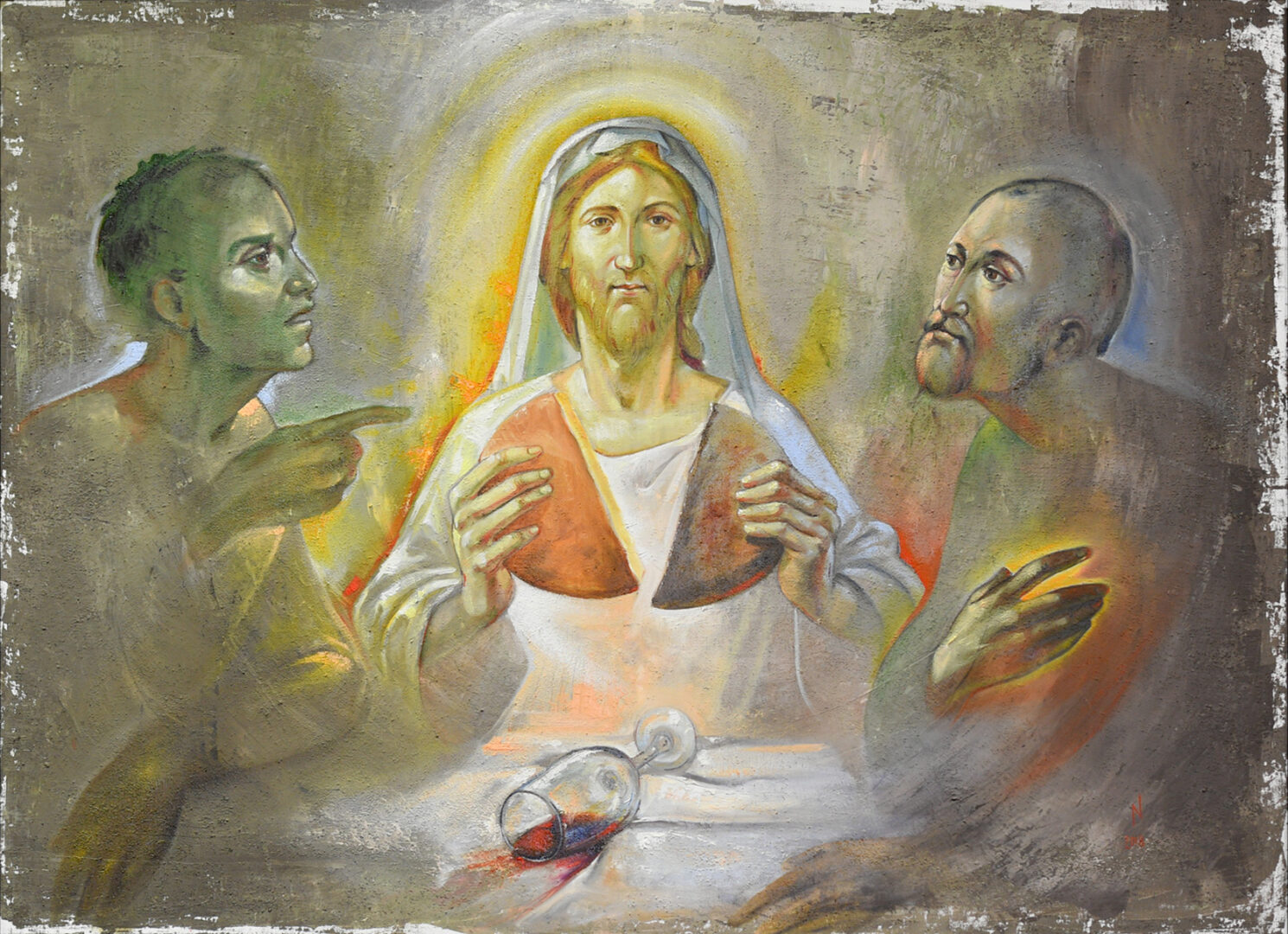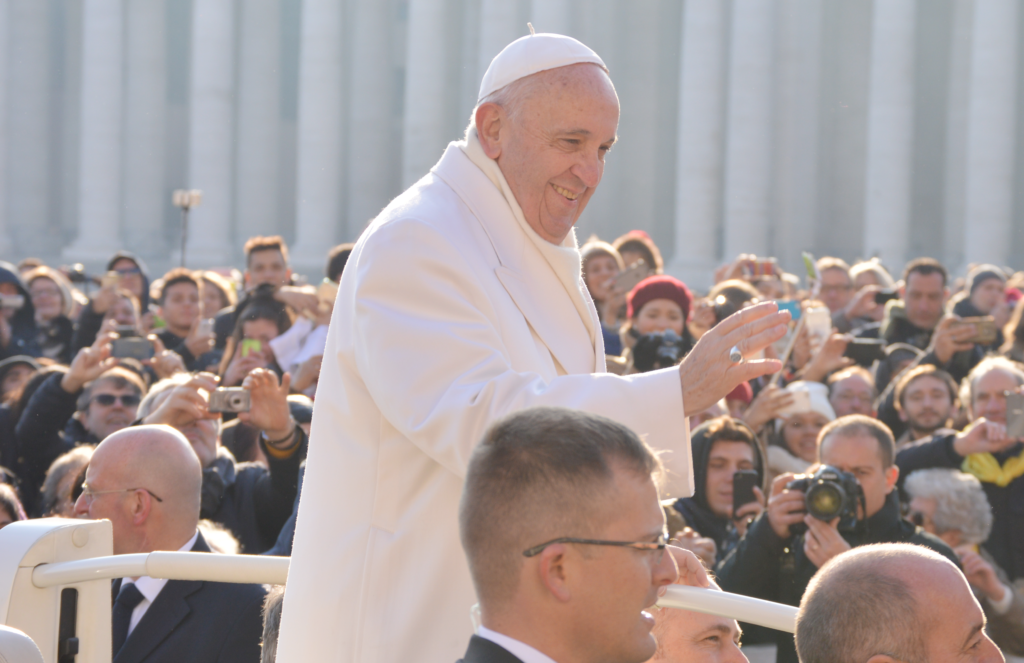The Church missioned to witness the Good News in word, gesture and deed
This past year, and inspired by the “Icon of Emmaus,” many bodies of the local Church have reflected upon their hope of deepening the inculturation of the faith in today’s Malta. Led by Bishop Joseph Galea Curmi, a process of in‑depth listening with priests, religious and laity was initiated to deepen the meaning of the word Christ is speaking to the Church in Malta through the Emmaus pericope. Not only could we, as local Christian community, whose faith has deep historical roots, identify with the disciples—man and woman—who left Jerusalem disheartened and afraid to walk to Emmaus; but we could also begin to taste of the conversion they experienced when the Risen Christ encountered them on their route and, filled with new zeal, they returned to the fold in the Holy City.
The eightfold process that was formulated is a description of the necessary markers of a synodal journey—a desire and deeply‑held hope that, just like the disciples of Emmaus, each one of us of the baptised in Malta recognizes our deepest fears, angst, disappointments and suffering … and rejoices! Together we are being invited to a journey where, as pilgrim people, we renew our vocation as missionary disciples on our land.

Part of this journey might entail coming to terms with our weakness and vulnerability; with our unfaithfulness or pride; with how we have failed to be salt, light and leaven in this land, but instead thought we could witness the gospel merely by being “Maltese culture” and by propagating attitudes of rigidity. But even if, like the disciples of Emmaus, we have tasted the bitterness of death, like them we are being invited to experience the resurrection and to be reborn as Christ’s Church.
Indeed, the disciples of Emmaus encountered the Risen Christ at their darkest hour. Likewise, it is in our own “Maltese” hour of darkness that Christ is inviting us to a renewed discipleship, to a life‑bestowing evangelisation, to a service rendered from the heart, and—like Nicodemus who went to meet Jesus in the darkness of night—to a new birth in the Spirit for the Church in Malta.
This is the hope and the challenge that our Shepherds proffered to us when they chose the Emmaus account as inspiration for our personal and communal discernment as Church: that we appropriate fully our identity and calling as the People of God in Malta, who as sinners are missioned to evangelize the land. In one Spirit, we are encouraged to spread our branches wide, to touch all aspects of life in our land and seas, and thus to shelter, to beautify, and to become a sign of new life in present day Malta.
This process is thus not a series of tasks, as though the Church were a “project” of ours, but it is an invitation, so that, as disciples, we may once again, sit at the Master’s feet and listen to what He has to teach us.
The four attitudes, inspired by Pope Francis’ programmatic Post‑Synodal Apostolic Exhortation Evangelii gaudium (November 24, 2013),that the local Church is being invited to embrace and apply to our daily living, are direly needed in our country. Only a Church who can understand deeply her vocation to be light of the world and her mission to be salt of the earth can fulfill this need. We are not called to impose our beliefs and opinions or, even worse, our selves, but, as leaven in dough, we are called to die so that the bread is transformed into the food that gives life to our brethren (Maltese or otherwise). A Church that listens, welcomes, accompanies the other (as we take care of one other) is also a Church that opens wide its doors and goes forth to spread the Good News.
It is also a sign of the times that the local Church—together with the Universal Church—is being challenged to be creative, by stripping down to the bare essentials of the Gospel, at this extraordinary moment in our recent human history: the COVID‑19 pandemic.
The Church, called to be “the body of Christ” in her witness of his salvation, is being challenged to lead the world through a process of renewal, where our very experience of being human, of being “embodied spirits,” needs to be “born of water and spirit” (Jn 3:5) as we reevaluate how we have been living as one global community, as one community of nations, in a world mediated by digital technologies. Pope Francis’ teaching in Laudato si’ (May 24, 2015), for a conversion to a profound “integral ecological flourishing” in distinction to lifestyles dominated by a “technocratic paradigm,” is being revealed to be more urgent than ever.

Indeed, it is perhaps the most profound irony that, while we are living the unnatural situation of human isolation, out of a profound desire for mutual solidarity and social responsibility to protect our bodies (both personal and collective), we are also seeking to be more present to one another through an extended or “mediated” presence, that makes us experience the world as if we have transcended our very flesh.
This new human mode of being, where we experience ourselves as being so much more than our physicality, and still so vulnerable and conditioned by the flesh, is the profound paradox that is leading us to rethink who we are being called to be, as Church, in this new “digital” environment. Through our ecclesial witness of the Gospel, we are being called to “humanise” and steward to integral flourishing what so far has been lived, on a global and local scale, in an illusory manner in our economy, in our political systems, even in our daily lives.
This new challenge is of truly inculturating the Gospel in a new digitally augmented context that must not forget its rootedness in the particularity of every human story, of every human land, of every “people.”
The prophetic gesture of the Synod of the Amazon reminded precisely of this: every culture’s uniqueness bound to its land, to its history, to its worship, must not be forgotten, must not be washed away, as we enter more decisively in a global digital environment. Our temptation so far has been to follow the “modern” logic that pretends that land, unique stories and even physical bodies matter little or not at all. The challenge being revealed glaringly by a pandemic—no less—is that not only do they matter, but we must renew our commitment to honour our bodies, our presence in the flesh, as we also learn to take responsibility for our extended “flesh” through technological mediation.
Perhaps COVID‑19 could be a learning experience for us, waking us up to drink of God’s mercy. It is indeed how we as Church are being called to be renewed by recovering the essence of the Good News, and allowing it to transform us, to discern fresh ways of becoming true Christians in a new world: in our worship, in our prophetic speech and teaching, in our daily witness in concrete acts of charity.
Our local Church, our People of God has an important role to play because of the uniqueness and richness of our tradition; because of our extreme resilience and ingenuity. Let us allow the Holy Spirit to guide us along this eightfold process of renewal as One Church along One Journey! Our commitments as People of God for the next years will need to consider the new circumstances that will gradually unfold. Thus, we are being invited to a process of ecclesial discernment that is even more necessary to truly consider how the Spirit is guiding our people’s flourishing in this particular reality.
In this context of extreme challenge but, nonetheless, of an invitation to spiritual renewal as Church in Malta, it is indeed a blessing that our land can still hope to welcome His Holiness, Pope Francis, in the near future.
The theme chosen—“They showed us unusual kindness” (Acts 28:2)—reminds how the Church in Malta was born in that act of “unusual kindness” shown by the people on this land. Acting with “unusual kindness” is the gift and mission of the People of God in Malta to one another and to the universal Church.

The heart of Pope Francis’ theology is an Argentinian appropriation of Vatican II’s theology of “the People of God.”[1] As first presented in Evangelii gaudium, 217‑237, on various occasions throughout these years of his pontificate, and most recently in the Post‑Synodal Apostolic Exhortation Querida Amazonia (12 February 2020), the “new” teaching that the Pope is inviting us to ponder is that, as “missionary disciples,” we are never simply called or missioned alone. We are rather called and missioned as “a people”: and not a “people” in an “ideological” sense, but always in a “real” incarnate manner, and therefore as a people who “inculturates” the Gospel in their unique way.
An “incarnate” people is a “cultured” (“cultivated”) people: with roots deep in a land, a strong trunk that reflects its growth in history, and that always branches out in acts of worship (cultus) that bear fruit.
The distinctiveness of this theology of being an enculturated “people of God” is reflected in the signature “cluster of concerns” of this Pontificate:
- the plight of displaced peoples (cut off from land and history);
- the care of our common home;
- the need to tend wounds in the “cultural” fabric, in particular deep‑seated conflict;
- the importance of openness to encounter and dialogue;
- the emphasis on initiating processes rather than dominating territories;
- the attentiveness to the little ones who, in their simplicity, express most eloquently their devotion to God.
The visit of Pope Francis to our islands—fragments of an ancient crossway between lands, right in the middle of a sea of ancient civilizations—gives the opportunity for a new articulation of the Pope’s “theology of the people.”
The “Maltese” who for millennia have lived on this land are not necessarily bound by blood, but, like a tree, they are rooted into the land, in history and through cultus. Being a “safe haven” in rough seas; a fragile space where civilizations encounter; puts the onus on all the people to “cultivate” their living together: by building a polis that can stand the test of time; through adapting justly to complex social relations; through nurturing a shared horizon of meaning.
Most strikingly, Pope Francis had also initially chosen to visit our shores on Pentecost Sunday 2020, evoking a desire in the “people of God who gather on this land” to be anothen, “born again” orreborn “from above”.[2] He is helping us develop anew a sense of mission to “cultivate” all the people on this land by recalling our first encounter with the Gospel: “Malat, from which Malta derives its name, meant a safe haven in the culture and language of the ancient sea‑faring Phoenician people.”[3] As St Luke narrates in the Acts of the Apostles, what characterised the people of Malta is that “they showed us unusual kindness” (Acts 28:2).
That kindness is a mark of friendship extended to the “other”; an arm reaching out to the “stranger” in perilous waters with the promise of fraternity. The Maltese Islands are not “a good and broad land, a land flowing with milk and honey” (Ex 3:8). But they are a “safe haven” for true encounter, where peoples from all over the Mediterranean have come together, set roots, exchanged their cultures and knit one story to become “one people” whose defining characteristics are resilience, ingenuity and generosity.
It is thus a trauma to our very being a “Maltese” people when fear, covetousness, violence and division rupture our social fabric, tearing us apart: one (or a group) against the other, seeking to outdo and overcome those whom we make our enemies.
It is not diversity that threatens our unity as “one people.” Rather, for millennia, differences—whether ethnic, cultural, or even religious—have been grafted onto an ever‑stronger trunk and have enriched the soil that has fed our identity as uniquely open and adaptable to new experiences and challenges.
As today’s secular Malta opens its shores to more migrants; as our small nation becomes increasingly plural and cosmopolitan, we are challenged to recover that original promise of being a “safe haven” and to be renewed as symbol of unity‑in‑diversity in a global digital context.
Malta, the island at the heart of the Mediterranean, can be a model of encounter, dialogue and reconciliation. What we live face‑to‑face, we can extend to our digital presence.
This responsibility falls more decisively on the “people of God” on these islands who, through their “unusual kindness” shown to the Apostle himself, today are called to witness Christ’s healing presence through listening, welcoming, accompanying and going forth.
[1] Lumen Gentium, Dogmatic Constitution on the Church, 21 November 1964. In its second chapter it presents the Church as “the People of God.”
[2] Charles J. Scicluna, Homily on Ash Wednesday, February 26, 2020, https://church.mt/lent‑is‑the‑spring‑season‑of‑the‑soul‑when‑we‑are‑born‑again‑the‑archbishop‑on‑ash‑wednesday/.
[3] https://www.vaticannews.va/en/church/news/2020‑02/pope‑francis‑malta‑apostolic‑visit‑scicluna.html

One Church, One Journey invites all the People of God in Malta to a process for ecclesial renewal that can grow organically. The process is to be taken as a synodal “journey”—following the same synodal method of the Maltese Diocesan Synod 1999–2003—spanning not only space and time, but introducing us progressively to the complex reality in which we are living and, thus, ever deeper into the challenge of becoming “a pilgrim people”. Hence, every step indicates the same number of points which open us to reflection: from the first unequivocal step, to the eighth step which is being presented as the eight ways through which we can truly become a Church that discerns; a Church who, like an orchestra, can perform harmonious music through diverse instruments since it is directed by the same Holy Spirit of God.
The Holy Spirit is the power, hidden in our hearts, who unites us and emboldens us to tread, even in the deepest darkness, through all challenges, to heal and sustain one another and those entrusted to us in our land. He lights every step of the way; He is the fire that never dies away; through Him we “wear Christ,” embodying Him. Just as our Master bestowed tenderness to all those he encountered, so we gaze at those who cross our path.
Thus, inspired by Christ’s encounter with his disciples on the road to Emmaus, and while remembering the birth of the Maltese Church by showing “unusual kindness” (Acts 28:2), we will continue to drink of the gifts of the Holy Spirit to be renewed as God’s Holy People in this land.
Each of our local communities will continue the journey of communal discernment to listen, welcome, accompany and go forth in concrete ways in our local “field hospital” where Christ desires to meet all men, women and children who are suffering through “his body and bride,” the Church.
Through studying the eight‑fold process presented at the Diocesan Assembly 2019, in the next four years:
- every home and small community who gathers in Christ’s name,
- every lay movement,
- every religious congregation,
- every ecclesial institution that serves society—especially the many Church schools and institutions of diakonia—and
- every parish,
will seek to be attuned more faithfully to its particular gifts and charisms of the Holy Spirit and to discern the call to do greater things in Christ’s name:
- by listening to his Word andgrowing in our contemplation of the divine expressed in our prayer and communal worship; from this wellspring of Life, we can open our hearts to truly listen to one another and to the signs of the times;
- by welcoming strangers in our midst, and thus seeking concrete acts of healing and reconciliation especially in service to the most vulnerable;
- by accompanying one another to actuate concrete reforms in the process of Christian life‑long formation and personal and communal integration;
- by being sent forth and thus discerning the concrete ways in which we are called to evangelise and witness God’s salvific mercy through concrete acts of service.
In the context of our witnessing as a Church, we recognise the value of powerful gestures that are prophetic signs of truth, justice, healing and reconciliation. Gestures speak not only in a way that moves, but in a way that exposes structural sin, that challenges deeper reflection and that proposes discernment for a way forward that conforms more transparently to the Good News.
As disciples of Christ, we must also emulate the Master, who
- Chose to save through obedience: hence we must choose God’s will and his glory and are not tempted to desire our own glory, to serve our self‑aggrandizement, or to instil rivalry and divisions because of our hardened heart;
- Chose to save by becoming poor: hence the importance of a dignified elegance, of a sense of measure in an otherwise consumerist world, of a beauty that attracts simply without ostentatious display;
- Chose to save by relating with friends: hence the central importance of relationships, characterised by a disinterested love, each according to his/her state;
- Chose to save by living in the world, by touching its wounds and by taking on ‘the smell of his sheep’: hence the call to become one with the complex realities of the world and to become light, salt and leaven—a sign of true hope for our land.



